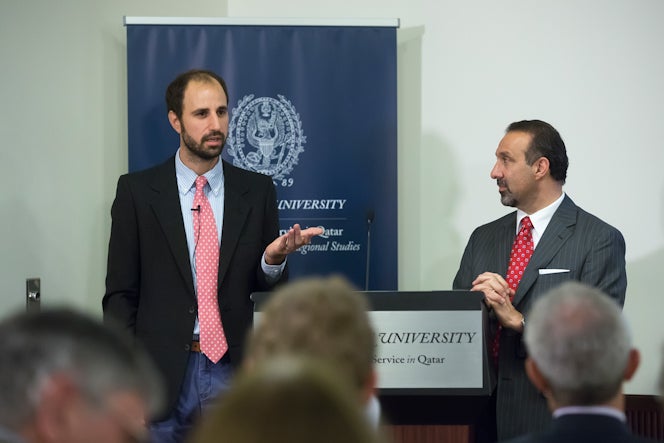Georgetown Lecture Presents the Science of Polling and Public Opinion in Qatar

Georgetown University School of Foreign Service in Qatar (GU-Q) recently hosted Justin Gengler, research program manager and senior researcher at the Social and Economic Survey Research Institute (SESRI) of Qatar University, for a public lecture titled “Studying Public Opinion in Qatar”. His presentation was a part of the Monthly Dialogue Series organized by GU-Q’s Center for International and Regional Studies (CIRS), and provided an overview of the way public opinion polling takes place in Qatar, the unique challenges that are faced by surveyors, and the changing attitudes towards the importance of public surveys.
“It was a distinct honor to have hosted a political scientist of Mr. Gengler’s caliber,” said Dr. Mehran Kamrava, Director of CIRS. “With so much effort going into research on topics of regional and local interest, the type of direct, household surveys that are conducted by SESRI are an invaluable addition to the body of knowledge that informs so much of the work that students and scholars do, among others.”
Apart from the Qatar Statistical Authority, SESRI is the only organization conducting household surveys in Qatar, and was established in 2008 in close association with the University of Michigan’s Institute of Social Research, a long standing survey research center that conducts several world recognized surveys.
“There are 2 primary modes of data collection in Qatar: household and phone surveys,” explained Gengler, describing the process of acquiring data directly from people living in Qatar and the region. For SESRI, approximately 85% of their work is household surveys, with recently added cell phone surveys now comprising 15% of their work. “Our samples are nationally representative, so we have separate sub-samples for Qatari citizens, expats, and migrant laborers.” He cites the size of samples of surveys as including anywhere from 800 to 4000 survey respondents.
“We are very busy despite being small. We currently have 10 household survey projects per year, and 3 phone survey projects per year, which is a lot for a small center,” he said. The types of surveys conducted by SESRI are mainly academic, with some commissioned work by state organizations, private industry, fellow researchers in Qatar University and elsewhere. Past surveys have included tracking Qatari nationals’ and foreign residents’ perceptions of local, regional, and international issues. “It’s not the case that we only study ‘innocuous’ topics that are primarily political or social. There are a lot of interests covered,” added Gengler.
He explained the levels of analysis for the data that has been collected, outlining the benefits, and limitations, of each. The primary level, explained Gengler, is a single data point or statistic and limits the benefit of the data. By comparing or analyzing the data across time to see how it has changed, or by understanding the societal context, more conclusions can be drawn. “This secondary level offers some basis for comparison, is more informative and helps to clarify the data.” And lastly, the tertiary level considers the relationship between responses and other variables to find patterns or draw conclusions that aren’t readily obvious with simpler analysis.
Citing the obstacles to public polling, Gengler said: “The main challenge in Qatar is the demographic. We have this need for separate sampling frames because we have different populations living in different areas. We also have multiple translations for expats, not just English and Arabic, also Filipino, Urdu, Nepali, Hindi, and more for our multi-population surveys. We have few Qatari nationals working as field surveyors, which can present some challenges, but we’re looking to overcome them.” However, Gengler remains positive about the future of surveying. “There is a newfound appreciation in the Gulf, including at the elite level, for this research. It’s seen as objective, based in empirics, and people see the value in staying ahead of public opinion. So in fact there is great interest in the region for honest data on the views of citizens.”
Justin J. Gengler is a contributor to the volume Sectarian Politics in the Persian Gulf, published by Hurst/Oxford University Press. His work has also appeared recently in Middle East Policy (2012), Journal of Arabian Studies (2013), and Middle East Law and Governance (2013), in addition to numerous policy-oriented publications. The mission of the Social and Economic Survey Research Institute (SESRI) is to provide sound and reliable data to guide policy formulation, priority setting and evidence-based planning in the social and economic sectors.